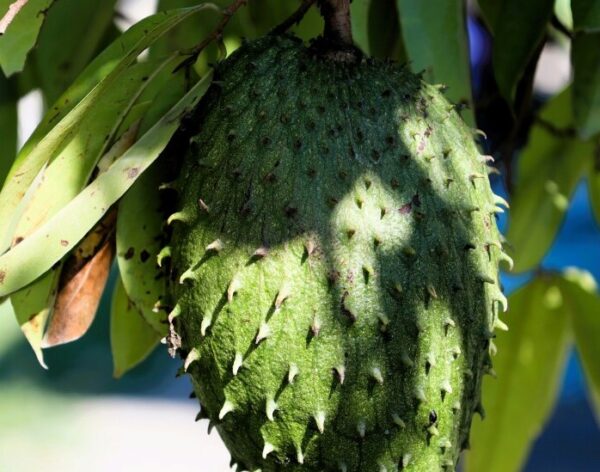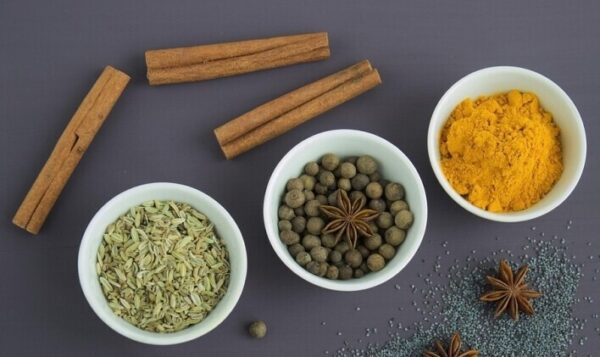Soursop, or Gaviola or guanabana, is a delicious tropical fruit packed with health potential. This peculiar fruit grows in the lush landscapes of the Caribbean, Central America, and parts of sub-Saharan Africa. It looks like a green, spiky football on the outside but hides a soft, custard-like flesh within.
In many cultures, soursop has been cherished not just for its unique flavor but also for its medicinal uses. From smoothies to desserts, it’s a favorite ingredient. We’re zooming in on soursop tea, brewed from the soursop tree leaves. Traditionally, it’s been used in various folk medicine practices, particularly in the Caribbean and Latin America, for its potential calming and anti-inflammatory properties.

Preparing soursop tea is pretty straightforward. The leaves are typically dried, then steeped in boiling water, like any herbal tea. The result is a beverage with a distinct, subtly sweet flavor with earthy undertones. Perfect on its own or as a base for more elaborate drinks, it’s a fantastic way to experience the essence of the tropics in your home.
Sip this aromatic delight warm from your favorite mug or enjoy it chilled as a refreshing iced tea. Soursop tea’s versatility makes it a lovely addition to any kitchen. Beyond taste, its origins, steeped in history and rich cultural traditions, offer a compelling story every time you brew a cup.
From its roots in indigenous practices to its current global presence, soursop tea bridges cultural heritage and modern wellness. Whether you’re looking to explore a new culinary experience or are interested in its wellness potential, soursop tea is a journey through taste, tradition, and health that promises to elevate your everyday tea ritual.
Health Benefits of Soursop Tea: Myth or Miracle?
Touted as a wellness elixir in some circles, soursop tea has a host of health claims. People often rave about its beneficial compounds’ potential to ward off everything from pesky colds to more serious ailments. But how much of this buzz truly holds weight?

Science gives us a clearer lens. Soursop is rich in vitamins C, B1, and B2, fiber, and antioxidants. These elements can support your immune system and contribute to overall health. The tea, made from its leaves, passes some of these benefits when brewed. Antioxidants are particularly emphasized for their role in fighting oxidative stress, which is what keeps your smile bright and your body spry.
Then there are the bigger claims: some enthusiasts argue that soursop tea might even aid in cancer prevention. Stepping back, drawing the line between anecdotal excitement and actual scientific evidence is essential. While preliminary studies suggest that soursop’s acetogenins possess properties that could potentially target cancer cells, concrete conclusions are still out of reach without more rigorous research.
Sorting myth from fact, don’t write off soursop tea if you’re on a wellness quest. Though not a miracle cure, it’s a flavorful ally that could complement a health-focused lifestyle. Enjoy it as part of your balanced diet, valued for its taste and contribution to daily hydration with some bonus nutrients.
Savoring soursop tea could indeed be more than just a flavorful experience. Even if it doesn’t hold all the miracle qualities some attribute to it, there’s nothing quite like cozying up with a warm cup of tea that feels both comforting and refreshing at once.
Potential Risks: Is Soursop Tea Safe for Everyone?
Soursop tea has its perks, but looking at the flip side is vital. A common question is whether guzzling this tropical brew is safe for everybody. Most people tolerate soursop pretty well, but as with anything, moderation is key. Since I do have diabetes, I go easy with this tea.
There’s some chatter about side effects, especially if you’re chugging down large quantities. One primary concern is related to the neurotoxic impacts. Some studies suggest that an acerogenin found in soursop might be linked to conditions like atypical Parkinsonism in high doses. So, pacing yourself is crucial to enjoying it safely. NOTE – go easy!
For pregnant women, kids, and folks with certain conditions, a little caution goes a long way. Always better to chat with a healthcare pro before adding soursop tea to your routine, especially if you’re expecting, nursing, or managing a condition like hypertension or diabetes. Soursop’s effects on blood pressure and sugar levels mean a check-in with your doctor is wise.
Allergic reactions are rare but possible. Please watch out for signs like rashes or trouble breathing, which, if they happen, definitely require you to cut back and seek medical advice.
Ultimately, balance is your best friend when exploring soursop tea. If in doubt, get the lowdown from your health advisor, and always listen to what your body tells you. Enjoy the brew as part of a varied diet, and let soursop tea be a delightful addition rather than the main dish.
Expert Opinions and Scientific Perspectives
Soursop tea has sparked quite the debate among experts and scientists. Nutritionists often point out its potential benefits while also cautioning about unverified claims. Herbert, a renowned nutritionist I chatted with, stresses keeping tea consumption moderate and in tandem with a balanced diet, pointing out the presence of valuable antioxidants and vitamins.
Diving into the research world, some studies offer fascinating insights into soursop’s chemical composition. Dr. Chang, a researcher in herbal medicine, emphasizes that while preliminary findings are encouraging, especially concerning cancer-fighting properties, a lot remains to be uncovered to truly understand its effects at therapeutic levels.
Is the buzz about soursop’s anti-cancer potential really justified? Researchers are interested, but it’s important to remember that many of the studies have been lab-based, often involving isolated soursop compounds rather than brewed tea. This distinction is crucial when interpreting the findings for everyday consumption.
Some skeptics in the scientific community highlight the need for more robust clinical trials. A lot of the existing evidence relies heavily on animal studies and anecdotal testimonies, leaving gaps in conclusive human trials.
While scientific perspectives continue to evolve, the consensus is to enjoy soursop tea with a discerning palate and a dash of informed caution. Staying updated on new research can guide your understanding and enjoyment of this tropical brew, ensuring it remains a beneficial and safe part of your lifestyle.
Incorporating Soursop Tea into a Balanced Lifestyle
Blending soursop tea into your daily routine can be both simple and refreshing. Think of it as a versatile beverage that you can enjoy anytime. Whether you’re easing into the day or winding down at night, a warm cup of this tropical tea can offer a soothing escape.

Can you switch things up? Kickstart your day by pairing soursop tea with a spritz of lime or a dash of honey. You can also blend it into smoothies for a nutrient-packed breakfast option. If you’re a fan of iced tea, cooling it down over some ice cubes with fresh mint can make a delightful afternoon pick-me-up.
Exploring recipes can open up a whole new realm of possibilities. Soursop tea can be a key ingredient in everything from lattes to cocktails. Mix it with ginger or lemongrass to create a flavor profile that tingles the taste buds.
When sourcing soursop tea, look for quality suppliers who ensure sustainable and organic practices. Farmers’ markets, health food stores, or reputable online sellers are great places to start when tracking down this flavorful tea.
Incorporating soursop tea isn’t about making it your sole beverage choice but enjoying it as part of a varied and balanced diet. Focus on variety, balancing it with other nutrient-rich foods and drinks, to nurture a healthy lifestyle.
PubMed Articles
NOTE: I am not a physician nor a professional medical person. You should consult your physician before you use any supplement.


Comments